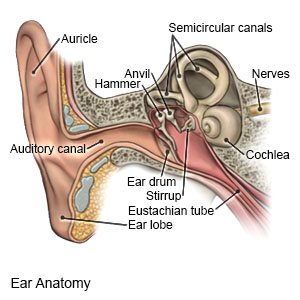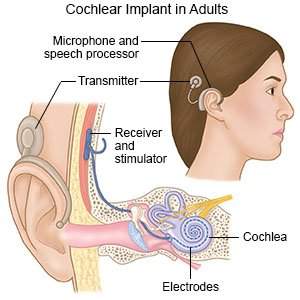Cochlear Implant Surgery
Medically reviewed by Drugs.com. Last updated on Aug 4, 2025.
What is cochlear implant surgery?
Cochlear implant surgery is used to place a cochlear implant in one or both ears. A cochlear implant is an electronic device that helps improve hearing in people who have severe hearing loss. A cochlear implant will not restore normal hearing, but it may help you better understand speech and lip movements.
 |
What are the parts of a cochlear implant?
A cochlear implant has 2 parts:
- The external part is worn behind your ear. It has a sound processor, microphone, and battery. It receives sounds and changes them into electric signals. Those signals are sent to the internal part called the receiver.
- The receiver is implanted under the skin behind your ear. It sends the electrical signals to electrodes that are placed into the cochlea of your ear. The cochlea sends those signals to your hearing nerve and brain.

What happens before cochlear implant surgery?
- A hearing test measures how well you hear sounds and words. You may be tested to measure how well you hear with and without hearing aids.
- CT or MRI pictures may show if you have problems with the structure of your inner ear. You may be given contrast liquid to help healthcare providers see the inner ear better on the pictures. Tell the healthcare provider if you have ever had an allergic reaction to contrast liquid. Do not enter the MRI room with any metal. Metal can cause serious injury. Tell the healthcare provider if you have any metal in or on your body.
- Vaccines may be given to protect you from meningitis. This is an infection of your brain and spinal cord. Cochlear implant surgery increases the risk of meningitis.
How do I prepare for cochlear implant surgery?
- Your healthcare provider will tell you how to prepare for surgery. The provider may tell you not to eat or drink anything after midnight on the day of surgery. He or she will tell you which medicines to take or not take on the day of surgery.
- Your healthcare provider will explain speech therapy so you know what to expect.
What happens during cochlear implant surgery?
- You will get general anesthesia to help keep you asleep during surgery. You may also get an antibiotic to prevent an infection caused by bacteria.
- Your surgeon will make an incision behind your ear along the hairline. The surgeon will open a bone called the mastoid bone to reach your inner ear. He or she will go through the opening in the mastoid bone to get to the cochlea. Your surgeon will make a hole in the cochlea and implant the electrodes. He or she will place the receiver against your mastoid bone. The incision will be closed with stitches.
What should I expect after cochlear implant surgery?
You may be dizzy for a day or two after surgery. The implant will not work right away. Your incision should heal in 3 to 6 weeks. After the incision heals and the swelling is gone, you will receive the external part of your cochlear implant. You will go to therapy to learn how to listen and understand sounds using your cochlear implant. You will also learn how to care for your cochlear implant.
What are the risks of cochlear implant surgery?
Parts of your ear or facial nerves may be damaged during the surgery. This can cause numbness and loss of movement to parts of your face. Cochlear implant surgery increases the risk of meningitis. This is an infection of your brain and spinal cord. You will be at a higher risk for meningitis your entire life. Your cochlear implant may not be in the right place, or it could stop working. You may need another surgery to fix it.
Care Agreement
You have the right to help plan your care. Learn about your health condition and how it may be treated. Discuss treatment options with your healthcare providers to decide what care you want to receive. You always have the right to refuse treatment. The above information is an educational aid only. It is not intended as medical advice for individual conditions or treatments. Talk to your doctor, nurse or pharmacist before following any medical regimen to see if it is safe and effective for you.© Copyright Merative 2025 Information is for End User's use only and may not be sold, redistributed or otherwise used for commercial purposes.
Further information
Always consult your healthcare provider to ensure the information displayed on this page applies to your personal circumstances.
